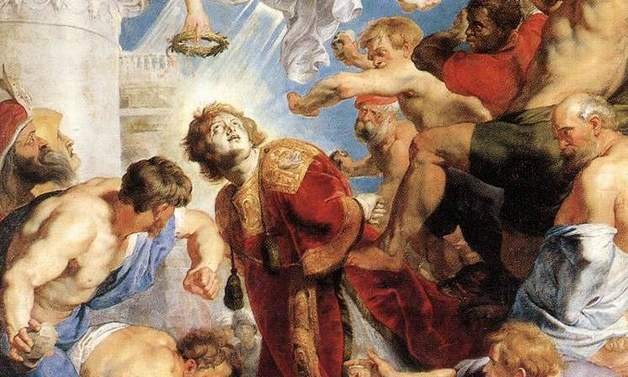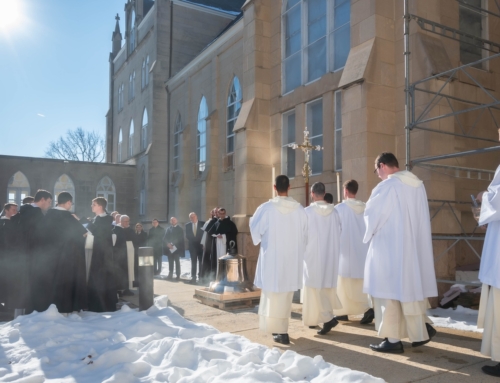Twice a year, every year, Christians get to multiply one day into eight. For the Church, the Nativity of Christ is so important that it demands not only a Feast day on December 25th, but also an Octave spanning the eight days to January 1st. The feast continues for an entire season, culminating with the Baptism of the Lord. Medievals, putting today’s partiers to shame, kept the festivities going until the beginning of February.
Since this panoply of feasting and fêting is centered on Christ’s coming as the child in the manger, it can be surprising that the Church in her wisdom selects December 26th to celebrate the martyrdom of St. Stephen. The Christmas season passes from birth to death in 24 hours—on day two no less.
The second day that demands an octave is, of course, Easter Sunday. Like Christmas, there is a single crucial day, which echoes over the following seven. Not to be outdone by the Christmas season, Easter extends for fifty days and is crowned with the Solemnity of Pentecost.
However, unlike the eight days of Christmas, there are no Saints’ days observed in the eight days following the Resurrection. Just as the sun’s light makes all other stars go dim in comparison, so it is with Christ’s victory over sin and death. To further mark this octave, the Church meditates over Christ’s victory with the 11th century Sequence Victimae Paschali Laudes.
Mark Twain is reputed to have said: “History doesn’t repeat itself, but it does rhyme.” The same could be said of the Liturgy, which during the Easter season, presents many of the same readings prescribed for Christmas. The aforementioned account of St. Stephen’s martyrdom is no exception: just as understanding his martyrdom is inseparable from the Incarnation, so his actions are indecipherable without the Resurrection. In this light, the text of the Victimae Paschali Laudes could help situate St. Stephen’s witness as part of the Easter season. It begins:
Christians to the Paschal Victim offer your thankful praises!
A lamb the sheep redeems; Christ who only is sinless,
Reconciles sinners to the Father.
When asked why he became a Christian, Chesterton answered “to have my sins forgiven.” Christ, infinitely merciful, reconciles us to the Father. However, He warns us that only those willing to extend mercy to others may receive it for themselves. St. Stephen, filled with the Holy Spirit, exemplifies this willingness, praying the Lord’s own prayer of mercy from the Cross: “Lord, do not hold this sin against them” (Acts 7:60).
Death and life have contended in that combat stupendous:
The prince of life who died, reigns immortal.
The Paschal Mystery is described here as a battle that has been waged and won. St. Stephen confirms this both in his irrefutable testimony and in his vision of Christ in glory at the Father’s right hand.
Speak, Mary declaring what you saw, way-faring:
“The tomb of Christ who is living, the glory of Jesus’ resurrection;
Bright angels, attesting, the shroud and napkin resting.
Yes Christ my hope is arisen; to Galilee he goes before you.”
The Sequence began by addressing the Christian faithful; here it addresses St. Mary Magdalene, Apostle to the Apostles. The power of Magdalene’s testimony does not stem from her own resources—at that time, she lacked honor, power, even legal standing. When contradicted, she, like St. Stephen, could only appeal to the motto of the Apostles Peter and John, saying, “It is better to obey God rather than men” (Acts 5:29).
Christ indeed from death is risen, our new life obtaining.
Have mercy, victor King, ever reigning.
“And as they were stoning Stephen, he prayed, ‘Lord Jesus, receive my spirit’” (Acts 7:59).
This scene was witnessed, of course, by Saul, who remained unmoved by St. Stephen’s act of total self-offering—in fact, he accepted the humble task of guarding the executioners’ cloaks as they carried out the sentence. This, St. Luke records, marks his complicity with the act. Given a glimpse of freedom under grace, Saul opted to remain under the Law.
Soon enough, though, Saul would be offered new life by the One who won it for him. This offer came while he was still breathing murderous threats against the Church, but through grace he was able to accept Christ’s pardon. Saul, better known as St. Paul, could now proclaim that he must obey God rather than men. Like Mary Magdalene, this new life came with the charge to extend to others, through preaching, the mercy offered to him.
“For if I preach the Gospel, that gives me no ground for boasting. For necessity is laid upon me. Woe to me if I do not preach the Gospel!” (1 Cor 9:16).
Amen. Alleluia.
✠
Image: Peter Paul Rubens, The Martyrdom of Saint Stephen







